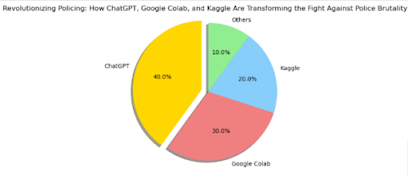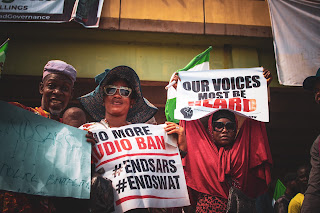Nigerian Security Forces Pursue Peaceful Protesters While Criminals Escape With Their Crimes.
Nigeria has seen an increase in security problems over the past two years — numerous terrorist attacks, inter-ethnic conflicts, abduction, and assaults on people and government facilities by purported secessionists have all pushed the nation and its inhabitants to the brink. Concerned about the country's deteriorating security situation, state governors established regional security outfits – Amotekun in the Southwest, Ebube Agu in the Southeast, and Shege-Ka-Fasa by the Coalition of Northern Group – to assist the government's security agencies in combating these criminals. However, the country's instability seems to be overwhelming security authorities, as new assaults are being reported daily. Despite this, the government, via its institutions, seems more intent on crushing Nigerians demonstrating against insecurity, poor administration, and deteriorating living conditions throughout the nation than on prosecuting criminals.
Between August 2019 and June 2021, several organizations organized many large demonstrations to demand improved governance and restructuring, among other things. However, the government has responded by cracking down on those protestors through security personnel, resulting in arrests and, in some instances, the deaths of protesters. Protests are being crushed
The Coalition for Revolution (CORE) organized a #RevolutionNow demonstration in August 2019 to demand better government and well-being for Nigerians. The protests, which took place in several states including Lagos and Abuja, were interrupted by security officials who arrested and imprisoned major protest organizers, including former presidential candidate Omoyele Sowore. They were charged with a treasonable felony under section 516 of the Criminal Code Act for allegedly organizing "a revolution campaign intended at deposing the President and Commander-in-Chief of the Armed Forces of the Federal Republic of Nigeria." A year later, the group staged another demonstration, this time seeking an end to President Muhammadu Buhari's "anti-people policies." The protests took place concurrently in Lagos, Ogun, Osun, Ondo states, and Abuja. However, security agents dispersed protesters in Lagos and Abuja.
According to reports, a team of security agents from the Department of State Services (DSS), the Nigerian Police, and the Army detained scores of demonstrators near the demonstration site. Additionally, the #EndSARS demonstration, which was in response to a spate of police abuses against Nigerian youth, was greeted with force and violence. Nigerians were enraged by the abuses of the now-defunct Special Anti-Robbery Squad (SARS) — a squad created to conduct covert operations against violent crimes. The #EndSARS protest, which began as an online movement in 2016, gained worldwide prominence in October 2020 when a video showing a SARS police officer killing a young Nigerian in front of the Wetland Hotel in Ughelli, Delta State, went viral. Unlike in the past, the campaign encouraged many victims of police brutality to speak up and join the movement, which culminated on Oct. 20.
On Oct. 20, near the Lagos Lekki Toll Gate, Nigerian Army personnel allegedly opened fire on demonstrators calling for an end to police violence. According to accounts, at least 50 people were wounded and many unidentified individuals were murdered in what has been dubbed the 'Lekki Massacre.' The Lagos State Government subsequently claimed, however, that the incident left up to 25 people wounded and just two people dead. Another demonstration at the Lekki Toll Gate was called off.
Four months later, a Judicial Panel established by the Lagos State Government to investigate the SARS unit's extrajudicial murders decided to investigate the Lekki shootings.
However, the Lagos State Government's decision to reopen the Lekki Toll Gate caused outrage and laid the groundwork for another protest at the toll plaza.
Nigerian youths, dissatisfied with the outcome, organized a new demonstration on Feb. 13. However, armed security agents detained around 20 protestors and dispersed others with tear gas at the site.
To express their dissatisfaction with the condition of the nation, some dissatisfied Nigerian youths called for a national protest against the government on June 12, which the government designated as Democracy Day. Protesters assembled at key locations across Nigeria's 15 states were dispersed by security personnel sent to quell suspected violence. On July 3, agitators in Southwest states took to the streets to demand that the Yoruba ethnic group be granted its own country. The unrest was predicated on the region's growing insecurity. After protestors disregarded official warnings to halt the planned action, armed police personnel were deployed to disperse the demonstrators. At least 20 people were detained and others dispersed in Lagos using tear gas and water cannons. A 14-year-old street vendor, on the other hand, was apparently killed by a stray gunshot fired by a police officer. The Lagos State Police Command has rejected the accusation, claiming that its personnel did not fire live rounds. Police departments consistently fail to react to distress calls.
Nigerians have become used to the Nigeria Police's slow reaction to distress calls during crises. For example, in Lagos State, Southwest Nigeria, confrontations amongst transport employees are common, yet the police often react slowly or with a tepid attitude. Commercial motorcycle operators and members of the National Union of Road Transport Workers (NURTW) clashed over toll collecting last May. The following brawl engulfed residents and vehicles in the mayhem. The brawl, which left many people wounded, raged for hours before the Lagos Police command sent police to put an end to it. Criminal herders are becoming more self-assured.
Criminal herders' activities are concerning in many areas of Nigeria, and many Nigerians believe that security agents are either overwhelmed by the task or just choose to look aside while the criminals' assault and pillage. For example, HumAngle reported on how the Police failed to react to distress calls made by residents of Igangan in the Southwest State of Oyo after an overnight assault by suspected criminal herders. At least 12 people were murdered and many homes were damaged in the assault. According to humane, local hunters and members of the O'dua Peoples Congress repulsed the assault after the police disregarded distress calls from community leaders.
Festus Ogun, a human rights activist and lawyer, said, "No right is complete without the right to fight for one's rights."
Festus highlighted the Nigerian Constitution as providing the freedom to gather as well as the right to protest. “Sections 39 and 40 of the 1999 Constitution protect the freedom to protest,” he said. “A democracy cannot be described as one in which people are not able to express themselves freely via protest and demonstration.” He stated, "Protesting is an integral element of free expression." Denying people their fundamental right to demonstrate is equivalent to setting fire to democracy.” Ogun said that there was no definitive legislation to justify security agents' assaults on demonstrators, adding that "any effort to rationalize such attacks would end in humiliation."
“Officers of the Nigeria Police Force acted recklessly against peaceful demonstrators, and it is a disgrace that an institution charged with safeguarding Nigerians' human rights and basic freedoms participated in such abuse of power,” Taiwo Makanjuola, an associate with Citizens' Gavel, stated.
Makanjuola said that "the evils that pervaded the Nigeria Police Force, like as brutality, indiscriminate murders, and extortion, required the demonstration, and therefore to see protestors being brutalized, unlawfully fired at, and detained for exercising their basic right begs the issue."
“This effort to silence people via clampdowns is what is reviving agitations for violence in Nigeria. To survive as a democracy, the conversation must be a continuous tool for resolving disagreements and expectations. A Nigerian citizen does not need to seek permission from any government agency or public authority to voice their dissatisfaction. Protest is not a privilege.”
Additionally, Tope Temokun, a lawyer and activist, stated, "If the people choose to peacefully protest against the killings in the land, kidnappings, and other challenges of bad governance in the land, the police's only role as citizens in uniform would be to march alongside the people, to ensure that the justifiable objectives of this justifiable protest do not get derailed."




Comments
Post a Comment